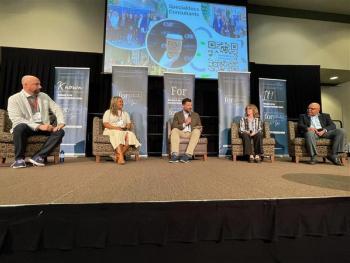LOUIS MALINOW, MD
Baltimore, Maryland
What my practice was like before concierge
My practice, in a nutshell, wasn't physically or emotionally sustainable for me. I had a traditional busy practice with over 3,000 patients. And my day would start at four in the morning — back then we were all going to the hospital — and back to the office at 7:30am. And from 7:30am until close, it was 25 to 30 patients, five days a week, 15-minutes slots. The best time of the day, back then, was the time I was spending with the patients. The worst part of the day was the avalanche of phone calls; they came all throughout the day. I just couldn't keep up with, and I had to take two hours of phone calls home with me every night. And I think that's when I really started to become overwhelmed and emotionally unhappy.
Why I decided to explore concierge medicine
I didn't think that the way I was practicing was best for the patients. I knew it wasn't best for me physically and emotionally. More importantly, I knew it wasn't right for the patients. I didn't have enough time to read and to learn, to research things and to take deep dives into each individual person. And that's really what I wanted to be able to do. I had to just treat diseases, my own practice was all about sick care.
Who is Louis Malinow, MD?
Medical Specialty: Internal Medicine, Board Certified Hypertension Specialist
Practice Name: Drs. Malinow, Oster & Malinow, PA
Practice location: Baltimore, Maryland
Years as a Concierge Doctor: 12
Medical School: University of Maryland School of Medicine
The benefits I’ve experienced from transitioning to concierge medicine
Back then, I was a mile wide and an inch deep. And now I'm a mile wide and a mile deep on every problem I go over with patients. So I think for me it was it was all about being able to spend more time with patients to do the job I knew I could do.
This allows me to be the perfectionist that I am absolutely hardwired to be — it was very hard to leave a visit unfinished. And that just never happens now. So I'm able to be my perfectionist self. I'm able to do what I love, the way I love to do it. And the best part of my day is that work is my happy place. And I absolutely could not say that about my own practice before.
My day is structured like this: I do three to our annual wellness exams every day, an each one lasts two hours. And those are just amazing visits, they're sort of marathons. It truly is amazing to not have that internal clock ticking away during these office visits.
The biggest challenge I faced during my practice transition
The hard thing was describing an idea to patients, and asking them to trust me that I was going to create something completely and totally different and amazing. I remember saying to patients, ‘Look, I this practice idea is going to help you live longer, it's going to help you live healthier. And I really want you to be a part of this.’ And I think when you say that to patients, patients really want to be with you. But it is hard to have a concept and to struggle a bit to describe that because you haven't done it yet.
The transition is challenging, and that is the primary reason why I decided to go with a battle-tested, time-tested network like MDVIP. With them, there was a well scripted and organized four months transition. It was hard, you take a day with 25 patients — because you're not slowing that down — and add five minutes to every visit because you need to personally talk to patients about what you're going to do. But it's your job to do that and I felt it was incumbent on me to be the one that told my patients, here's what I'm doing, here's why I'm doing it.
If I could do the practice transition again, what would I do differently?
My transition, went phenomenally. I did not make a mistake that a lot of other doctors make doing
“I'm able to do what I love, the way I love to do it.”
this transition, and that is profiling patients. I think there is a misperception out there that this type of medicine— whether you call it concierge or concierge style, which is the way I would describe my practice — isn't for everyone. And I think a lot of doctors make the mistake, ‘I'm going to talk to this man or woman because he or she is a CEO or lawyer or or somebody who may have a big income, and they don't talk to the policeman or the teacher or the house cleaner. I talked to everyone just the same.
How concierge has affected my feelings of burnout, work-life balance and career satisfaction
I was just upset, I was anxious. Some days I was just downright miserable. And I didn't know how I would make it through the day. Now I can't wait to get out of bed and get to work. And my day is paced, much less like a sprint, and much more like a slow jog. I'm able to really be a part of my patients’ lives and to really get to know them as people and souls. For the first 11 years I was in traditional practice, and I missed everything in my life. I didn't see my kids grow up, I missed all the school plays, the sports, my marriage, everything. And now I've missed nothing, I don't have to cut any corners.
Why I chose my concierge vendor
I chose MDVIP because they were incredibly organized, incredibly well-scripted; they have a department for everything. So they have the transition department to help you go from your old practice to your new practice. They had a metrics calculator that told me this going to work for me, and not only predicted with a high degree of accuracy how many patients I would have. Because that that's a big concern for a lot of doctors. If you're going to make this change, you at least want to have a break-even on your salary. There's a legal department, regulatory department, EHR department and IT department.
I think too many doctors basically transition their practice alone, or with the help of an attorney they know without the help of a big network. And they don't open with the large numbers that MDVIP doctors open with, and they don't have the help that they need.
My advice for physicians considering concierge
The most common comment from doctors who finish a transition in my network is ‘I wish I had done this sooner.’ I think as doctors we're all healthy skeptics, and we are all victims of our own paralysis by over analysis. And you don't want to do that.
I'm sure there are amazing doctors out there that are somehow able to create what I'm describing in a traditional setting. But, to me traditional internal medicine, even if you're really good and you're really busy, is like the standard American diet, and almost no one that eats that is healthy. And so if you can create this kind of practice for you, you should.
Editor's note: This transcript was edited for length and clarity.







